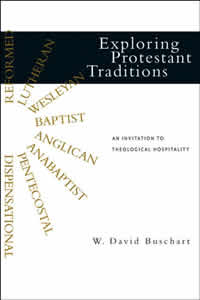Book Notes
 W. David Buschart, Exploring Protestant Traditions; An Invitation to Theological Hospitality (Downers Grove: InterVarsity Press, 2006), 373pp.
W. David Buschart, Exploring Protestant Traditions; An Invitation to Theological Hospitality (Downers Grove: InterVarsity Press, 2006), 373pp.
In the introduction to this book that deserves a wide readership, theologian David Buschart recounts a conversation with his mother when he was about ten, the gist of which was that whereas his buddies were Catholic, Presbyterian, and Methodist, his mother described his family as "just Christians." That succinct description had its merits, and it satisfied Buschart in some important ways for some time, but later he began to observe a troubling pattern. Why all the many denominations if there was one Gospel? How were they similar and how were they different? Even more troubling, why did nearly every Christian tradition try to "occupy an ecclesiastical or spiritual high ground," writes Buschart, "as the genuine descendants of Jesus Christ and 'the New Testament church'"—unlike, of course, all those other posers and wannabes.
This book addresses those and similar questions for eight Protestant traditions— Lutheran, Anabaptist, Reformed, Anglican, Baptist, Wesleyan, Dispensational, and Pentecostal. After introducing each chapter with a personal experience of the tradition under consideration, Buschart traces their historical origins and later developments (where they came from), explains how they do theology (theological and hermeneutical method), and then presents two characteristic beliefs or doctrines. He quotes copiously from each tradition's own sources (the 80 pages of footnotes are a goldmine for further reading), letting them speak for their own selves. He differentiates, as far as possible, the main unifying core of a given tradition, but also the diverse voices within a tradition. Not all Lutherans or Baptists believe exactly the same, for example, even though they enjoy a shared heritage. The end of each chapter includes a brief bibliography for further reading.
Buschart writes to describe and to affirm, not to convert, defend, or attack. Only in his concluding epilogue does he tip his hand and explain very briefly where he agrees and disagrees with each of the eight traditions. By cultivating the virtue of "theological hospitality," we welcome traditions different from our own into our lives with the express intent of learning from them. Modesty about our own theological conclusions, the particularities of our own faith tradition, and the limited horizons of our own views all remind us of the importance of affirming those who are different from us. In a concluding chapter Buschart makes a case for the "fundamental validity and importance" of both preserving the unity of the church and celebrating its diversity. His book will help all of us move beyond stereotypes to a spirit of generosity that can only strengthen the church.


